#philosophical history
Explore tagged Tumblr posts
Text
"It is only the man whose intellect is clouded by his sexual impulses that could give the name of the fair sex to that under-sized, narrow-shouldered, broad- hipped, and short-legged race; for the whole beauty of the sex is bound up with this impulse. Instead of calling them beautiful, there would be more warrant for describing women as the un-aesthetic sex. Neither for music, nor for poetry, nor for fine art, have they really and truly any sense or susceptibility; it is a mere mockery if they make a pretence of it in order to assist their endeavor to please. Hence, as a result of this, they are incapable of taking a purely objective interest in anything; and the reason of it seems to me to be as follows. A man tries to acquire direct mastery over things, either by understanding them, or by forcing them to do his will. But a woman is always and everywhere reduced to obtaining this mastery indirectly, namely, through a man; and whatever direct mastery she may have is entirely confined to him. And so it lies in woman’s nature to look upon everything only as a means for conquering man; and if she takes an interest in anything else, it is simulated–a mere roundabout way of gaining her ends by coquetry, and feigning what she does not feel. Hence, even Rousseau declared: Women have, in general, no love for any art; they have no proper knowledge of any; and they have no genius." - Arthur Schopenhauer, 'On Women'
quoting Rousseau in defense of what's totally not a misogynist bent of philosophy. But anyway, ol' Schop is good on a lot of things. Take the horrendously misogynist with the good, right? Or not. Don't cancel me, brah.
#philosophy#schopenhauer#misogyny#on women#philosophical history#feminism#philosophical quotes#quotes#rousseau#history of philosophy#women's history#Arthur Schopenhauer#mysogynist
0 notes
Text
youtube
TODAY IN PHILOSOPHY OF HISTORY
David Hume and a Deflationary Philosophy of History
Tuesday 07 May 2024 is the 313th anniversary of the birth of David Hume (07 May 1711 New Style, 26 April 1711 Old Style, to 25 August 1776), who was born in Edinburgh on this date in 1711.
Hume’s reputation as a philosopher only continues to grow with time, but during his life he was a failure as a philosopher though found success as an historian. Hume’s distinctively empiricist and skeptical philosophical views provide little in the way of a positive philosophy of history, but they can be understood as a deflationary philosophy of history that gives us a robust principle of selection for history.
Quora: https://philosophyofhistory.quora.com/
Discord: https://discord.gg/r3dudQvGxD
Links: https://jnnielsen.carrd.co/
Newsletter: http://eepurl.com/dMh0_-/
Text post: https://geopolicraticus.substack.com/p/david-hume-and-a-deflationary-philosophy
Video: https://youtu.be/D91ilZJx_Xo
Podcast: https://spotifyanchor-web.app.link/e/7VZ9mD9LpJb
#philosophy of history#youtube#David Hume#empiricism#logical empiricism#deflation#deflationary#Enlightenment#miracles#philosophical history#Youtube
0 notes
Text
One of the recurring philosophical questions is:
"Does a falling tree in the forest make a sound when there is no one to hear?"
Which says something about the nature of philosophers, because there is always someone in a forest. It may only be a badger, wondering what that cracking noise was, or a squirrel a bit puzzled by all the scenery going upwards, but someone. At the very least, if it was deep enough in the forest, millions of small gods would have heard it.
Things just happen, one after another. They don't care who knows. But history...ah, history is different. History has to be observed. Otherwise it's not history. It's just...well, things happening one after another.
Terry Pratchett, Small Gods
#history monks#small gods#discworld#terry pratchett#history#causality#events#meaning#philosophy#philosophers#observation#reality#perception#knowledge#squirrels#badgers#the nature of philosophers#things just happen#if a tree falls in a forest
2K notes
·
View notes
Text
god this really sucks, I'm gonna [remembers that suicide jokes are bad for my mental health] write a 500-page philosophical treatise
#many such cases#philosophy#philosophy memes#age of enlightenment#existentialism#and probably countless others#history memes#1700s#david hume#bernard mandeville#but like basically almost every philosopher you can think of#shitposting
280 notes
·
View notes
Text

Hypatia by Julius Kronberg
#hypatia#art#julius kronberg#philosophy#philosopher#scrolls#alexandria#history#antiquity#roman#roman empire#egypt#neoplatonist#astronomer#mathematician#europe#european#eastern roman empire#paganism#pagan#ancient greece#ancient rome#greek#ancient greek#neoplatonism
197 notes
·
View notes
Photo

Alchemical figures carved on the tomb of Nicholas Flamel (1418)
#art#alchemy#alchemical#history#mysticism#mystics#philosophers#platonic#philosophy#theology#occult#wisdom#nicholas flamel#u
66 notes
·
View notes
Text

A decade ago, the world had a brief fascination with José Mujica. He was the folksy president of Uruguay who had shunned his nation's presidential palace to live in a tiny tin-roof home with his wife and three-legged dog.
In speeches to world leaders, interviews with foreign journalists and documentaries on Netflix, Pepe Mujica, as he is universally known, shared countless tales from a life story fit for film. He had robbed banks as a leftist urban guerrilla; survived 15 years as a prisoner, including by befriending a frog while kept in a hole in the ground; and helped lead the transformation of his small South American nation into one of the world's healthiest and most socially liberal democracies.
But Mr. Mujica's legacy will be more than his colorful history and commitment to austerity. He became one of Latin America's most influential and important figures in large part for his plain-spoken philosophy on the path to a better society and happier life.
-- Here's a gift link from me to bypass the paywall and read this wonderful New York Times interview of lifelong activist, revolutionary, and former Uruguayan President José "Pepe" Mujica, who is still trying to pass along his hard-earned wisdom and political philosophy even as he's likely dying from cancer.
#History#José Mujica#Pepe Mujica#José “Pepe” Mujica#Uruguay#Latin America#Latin American Politics#Liberals#Progressives#Politics#Socialism#New York Times#Wisdom#Revolutionaries#Activists#Philosophers#Philosophy#President of Uruguay#Latin American Leaders
59 notes
·
View notes
Photo
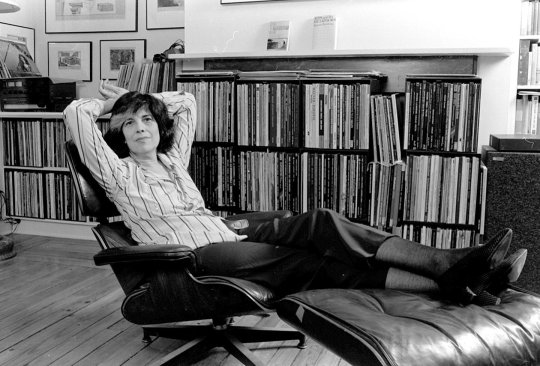
Susan Sontag (deceased)
Gender: Female
Sexuality: Bisexual
DOB: 16 January 1933
DOD: 28 December 2004
Ethnicity: Ashkenazi Jewish
Nationality: American
Occupation: Writer, philosopher, activist
#Susan Sontag#lgbt history#lgbt#lgbtq#bisexuality#female#bisexual#1933#rip#historical#jewish#ashkenazi jewish#writer#philosopher#activist#popular#popular post
172 notes
·
View notes
Text

Well there was a meme out there with Rousseau wearing a schoolgirl outfit which I recreated about 2 years ago and there you have it
#digital art#digital painting#artists on tumblr#my art#artwork#jean jacques rousseau#rousseau#digital illustration#history memes#philosophical#philosophy memes#voltaire#fanart#art#just joking
138 notes
·
View notes
Text
youtube
TODAY IN PHILOSOPHY OF HISTORY
Friedrich von Schlegel and Philosophical History
Sunday 10 March 2024 is the 252nd anniversary of the birth of Karl Wilhelm Friedrich von Schlegel (10 March 1772 – 12 January 1829), who was born in Hanover on this date in 1772.
Schlegel knew all of the movers and shakers in the romantic movement, and his life was like the entire romantic movement in miniature. He was born into a Protestant family, became a freethinker in college, wrote a novel that was considered scandalous about his affair with an older woman whom he eventually married, and, after he married, he converted to Catholicism. In his young days as a romantic he said that, “The historian is a prophet facing backward,” and, while he eventually distanced himself from his early romanticism, his later work in philosophy of history embodied the spirit of this youthful aphorism.
Quora: https://philosophyofhistory.quora.com/
Discord: https://discord.gg/r3dudQvGxD
Links: https://jnnielsen.carrd.co/
Newsletter: http://eepurl.com/dMh0_-/
Podcast: https://podcasters.spotify.com/pod/show/nick-nielsen94/episodes/Friedrich-von-Schlegel-and-Philosophical-History-e2gtm8i
#philosophy of history#youtube#Friedrich von Schlegel#romanticism#philosophical history#Creuzerstreit#Youtube
0 notes
Text








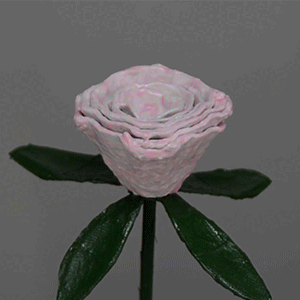

Alchemy stimboard (based on real-life historical alchemy)
x x x x x x x x x Banner
Though it isn’t my footage, I took the time to make the gif in the center. See my terms of use BEFORE you reupload!
Also, please do NOT tag with HP tags or use for HP content. Thank you for honoring my consent!
#albedo#alchemy#azoth#chemistry#citrinitas#emerald tablet#history#iosis#leucosis#liquid metal#magnum opus#mercury#metal#nigredo#occult#philosopher's stone#rubedo#salt#spirit#stim#stimboard#sulfur#sulphur#the great work#xanthosis#content: stimboard#content: upload
35 notes
·
View notes
Text

Philosophical Vanitas (1627-1703) by Matthias Withoos Amersfoort.
#art#aesthetic#painting#artwork#art history#dark academia#dark aesthetic#chaotic academia#dark art#paintings#oil painting#baroque#fine art#classical art#classic art#oil on canvas#arthistory#artgallery#philosophical vanitas#matthias withoos amersfoort
1K notes
·
View notes
Text
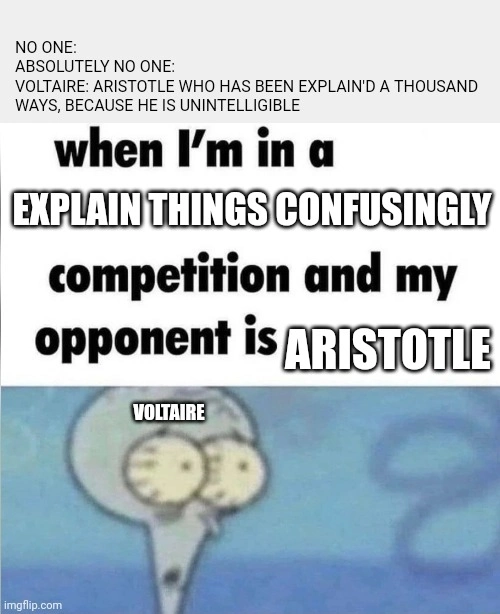
#it's not exactly a literature meme but it's close enough#aristotle#Voltaire#funny memes#literature memes#literature#memes#funny#meme#philosophy#the enlightenment#history#history meme#philosopher#i agree with voltaire#but i still like aristotle
92 notes
·
View notes
Text
Camille Desmoulins and Maximilien Robespierre – doomed by the Revolution?
a second part of the answer to the ask kindly sent by @iron--and--blood - first part can be found here
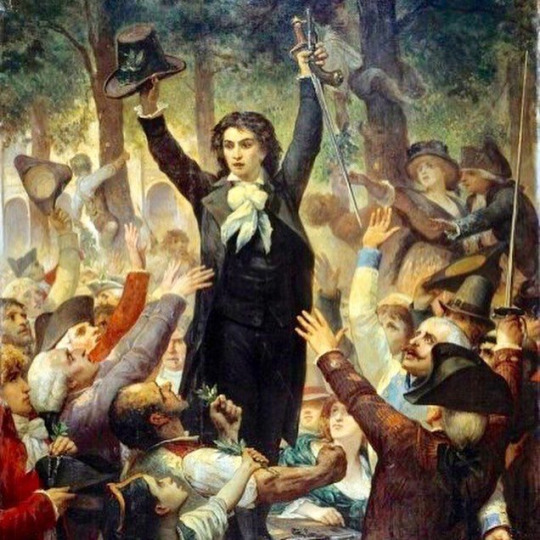
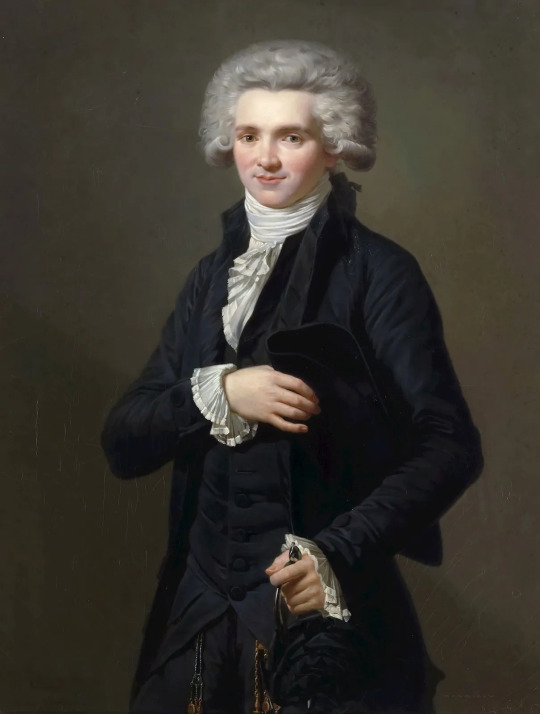
Okay, so I tried to follow the sources and I ended up missing what is arguably the key question. I think that there is enough evidence that warrants seeing Camille and Maximilien’s relationship as a ‘friendship torn apart but the revolution’, but could it in fact be something more that the chain of events of the mid-1790s ended up destroying?
(aka the good old “were they gay?” question)
It’s probably not surprising to anyone that there is no conclusive evidence that would suggest that either of them was definitely queer or that they were involved in some kind of a relationship. For context, the French Constitutional Assembly did decriminalise homosexuality, since there was simply no mention of private same-sex relationships it in the penal code of 1791.
Of course, there would still be a stigma surrounding queerness, seeing how France was a Catholic country – well, up to that point. On the other hand, it is also important to remember that anyone who received a higher education at that time would be well versed in classical authors (Greek and Roman that is), so they would have a framework for a positively viewed queer attraction/relationship (I'm mostly thinking of a kind of Alcibiades/Socrates vibes here. I think it sort of fits? Well it does in my headcanon anyway...). Camille especially seemed to be really into classics, making references to classical authors, history or mythology in approximately every other sentence.
CAMILLE – VICES HONTEUX AND A POSSIBILE BICON
If we consider Camille, I think it is clear that he was attracted to women. I think that the historical sources show that he genuinely did love his wife - Lucile - although it may also be true he was bit of a cad. There is a whole deal with him and Lucile’s mother with whom he apparently exchanged some flirty letters? I honestly need to look into it more at some point.
That said, attraction to women of course doesn’t exclude attraction to men. The one thing that would suggest Camille might have pursued a same-sex relationships is the reference to “vices honteux“ (shameful vices), which Saint-Just claims were attributed to Camille by Danton. We also learn from Robespierre’s note that this refered to something that was ‘totally unrelated to the revolution’.
So we know it’s something that would be seen as ‘shameful’ behaviour, but nonetheless a private matter. Could it be interest in same-sex relationships? It’s of course hard to say, but the theory is not completely implausible. For a discussion about this, I recommend this article.
MAXIMILIEN – A CONFIRMED BACHELOR?
With Maximilien Robespierre, it gets a little more complicated. He was essentially a confirmed bachelor, living with a family that adored him but that was not his own (and also a dog. He had a dog.) Talk about a found family trope!
Some sources claim that he was engaged to Éléonore Duplay, but Robespierre’s sister for one vehemently denies this. It’s true that he could probably easily have married her – I can’t imagine her family being opposed to it, far from it probably – but the fact is that for one reason or another, he did not.
He also didn’t really seem to capitalise on his massive popularity among the Parisian women. (Though, to be fair, neither did Rousseau and he was… well I guess he was his own version of heterosexual.)
Sure, one can interpret that as Robespierre being a workaholic or putting the revolution above everything else, but I personally think it is very possible that he would be considered to be on the asexual spectrum by today’s standards.
That said, although France was moving away from institutionalised religion at that point, Catholic guilt could certainly play a role, especially in someone who prided himself in his moral conduct and was told to be rigid about the rules. So the possibility of him being closeted as an explanation for his lack of interest in women would also not be completely off the table.
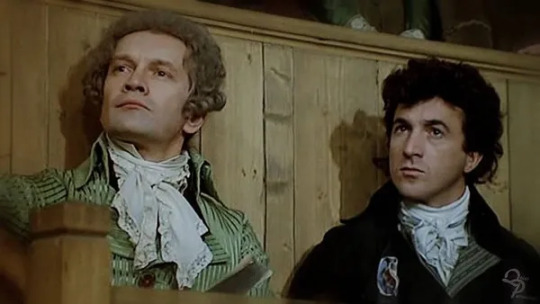
As to Camille and Maximilien being together in some way? I think there is certainly a precedence for this type of relationship in adolescence. Seeing that they have studied together (and shared enthusiasm for classics probably), it is not impossible, though of course, it is highly speculative.
I think it is also fair to say that Robespierre went above and beyond for Camille until the last few months. That is something he probably would have not done for many other people. He actually said as much himself:
“Learn, Camille, that if you were not Camille, one could not have so much indulgence for you.“
Was it because Camille was universally liked by the revolutionaries for all the good he has done? Possibly, but I think one can also read more into it. It certainly suggests that Camille was special in some way, and the fact that Robespierre uses ‚one‘ instead of ‚I‘ does not necessarily mean he is not speaking about himself here.
CAMILLE AND MAXIMILIEN IN THE MEDIA
When it comes to media portrayal, the relationship often comes across as queer-coded - to an extent.
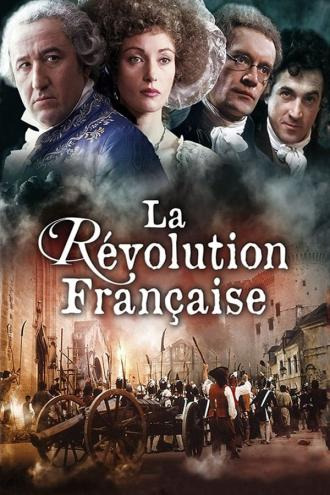
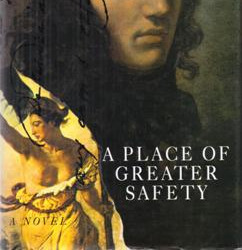
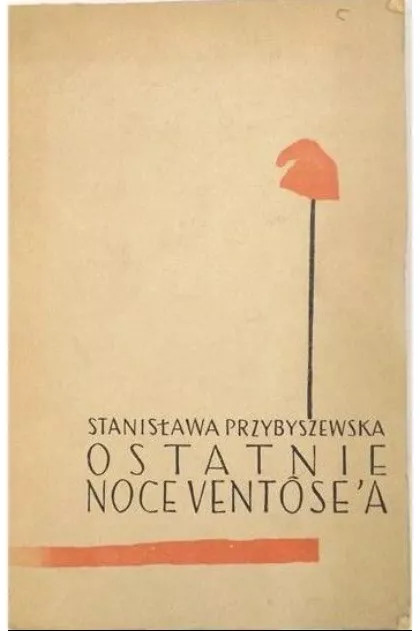
In La Révolution française, this aspect is more prominent between Robespierre and Saint-Just, but with some well-timed smiles and glances, it almost reads as a tragic love triangle between the three. There are some unfortunate implications however, mainly that the hints of Robespierre's queerness in the movie are implicitly associated with his descent to tyrany. Ugh. (And let's face it, a kind of effeminacy linked to villainy as well. Honestly, who thought that kind of portrayal would be a good idea? Kudos for making a historical movie about the French Revolution come across as homophobic I guess.)
Hilary Mantel straight-up makes Camille Desmoulins bisexual (ish?) in A Place of Greater Safety, though there are <a lot of> issues with that portrayal, as discussed here (watch me linking another mutual's great post! Frevblr is truly the best). Not sure how the relationship with Robespierre is presented here since it’s one of the books I’ve been in the middle of for months.
And then there’s Stanisława Przybyszewska of course. She would honestly warrant a separate post, but long story short: in her works, there is no doubt about the fact that she portrays the relationship between them as queer. She invokes the Erastes/eromenos dynamic between them (quite explicitly, referring to Camille as an ephebe at one point) and makes the attraction between the two seem palpable. There is plenty of queer (under)tones to be found in The Danton Case, but in Last Nights of Ventôse , she straight up interprets the fall of the Dantonists as Camille running into Danton’s arms to spite Robespierre for snubbing him and rejecting his devotion (romantic advances?). And it gets quite physical – not in a way that would warrant an E rating, but it would certainly deserve one for the sheer emotional intensity.
#there is a great fic that explores the idea of Robespierre being ace btw. Features some A+ philosophical discussions as well#the only issue is the fact that the other person in the pairing is --#no - shan't say!#frev#french revolution#asks#camille desmoulins#maximilien robespierre#queer history#frevblr#frev community#robesmoulins#1700s#history#stanisława przybyszewska#hilary mantel#a place of greater safety#the danton case#la révolution française#la revolution francaise#bisexuality#asexuality#Éléonore Duplay#robespierre#desmoulins#queer analysis#saint-just#louis antoine de saint just#lucile desmoulins#georges danton
94 notes
·
View notes
Text
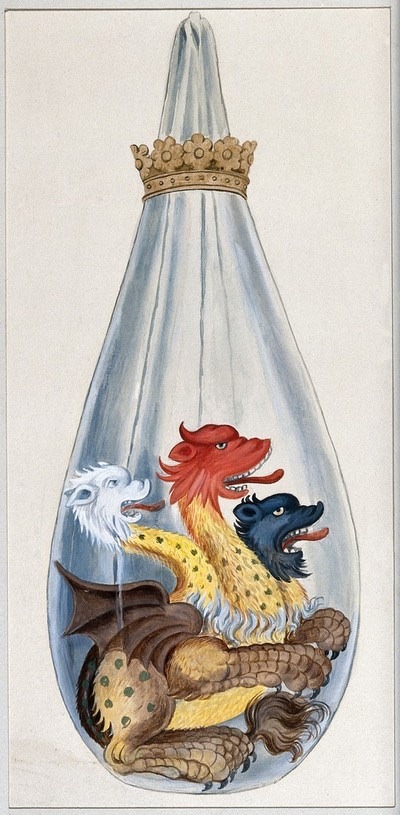
A three headed monster in an alchemical flask.
The three heads represent the composition of the philosopher's stone: salt, sulphur, and mercury.
Watercolour painting by E.A. Ibbs. Circa 1900
#history#curiosity#own post#alchemist prime#alchemy#medicine#art history#artwork#watercolourpainting#philosopher’s stone#chemistry#monster
273 notes
·
View notes
Text
The Purim of the Philosophers by Jonathan Edelstein


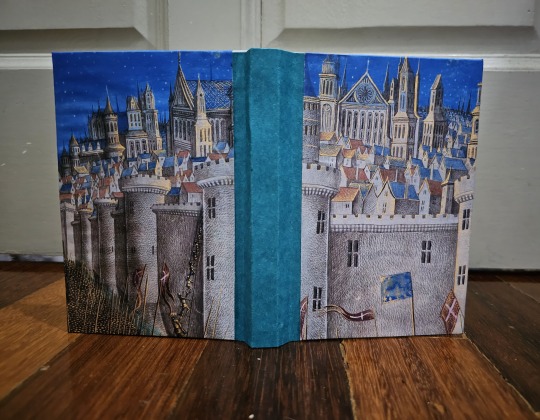
Jonathan Edelstein has cropped-up in this blog for several times now, and not without good reason. I knew him from almost a decade ago on an internet forum and his stories - short and long-form - have captivated me by their depth and ingenuity.
So no surprise, I decided to bind yet another short fiction of his. After my first two binds of his work, I actually made a promise to myself to bind two more stories of Jonathan's before the year closes out.
One of them was Of Letters They Are Made, and the other is this: The Purim of the Philosophers.
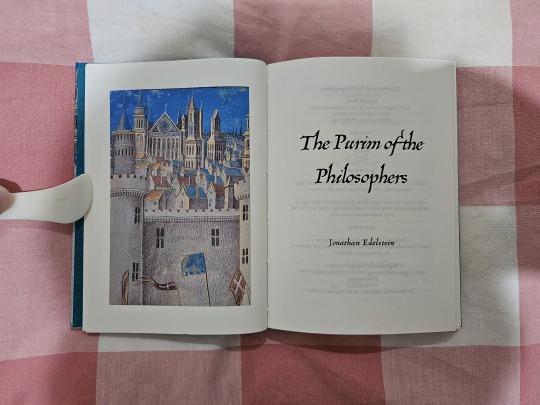


Set in an alternate France where the Albigensian Crusade went unfinished, the Languedoc is its own kingdom, and the political situation is still explosive, The Purim of the Philosophers tells of a Jewish official sent by the Languedoc king to the city of Marseilles to quell tensions between the Jewish communities, all while the French north is gearing up for another war with the south...
Now, while this all sounds fascinating, I doubt I will remember all the background context in 20 years' time. That was why I decided to write a preface to explain the bewildering history of the region, balancing out the need to explain history with the constraints of a small page.
To be honest, I think there is enough historic oddness about southern France to make an original compendium, but I digress.
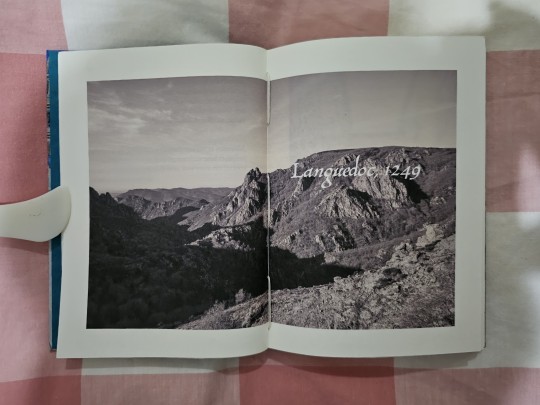
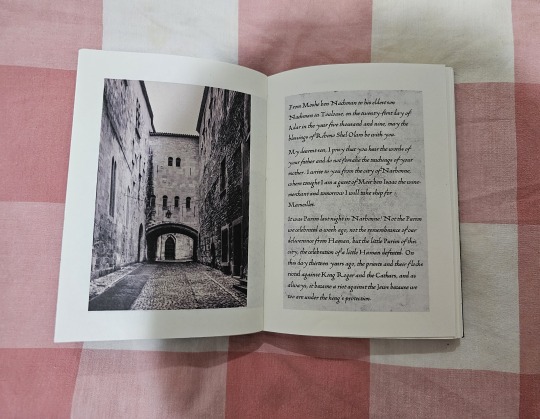
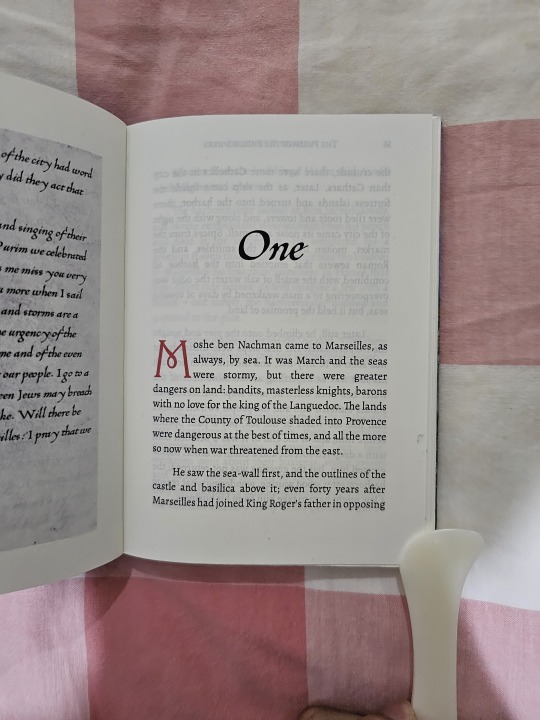
As with previous binds, I have a love for filling in pages with images that capture the feel and mood of the story, and this bind is no exception.
Additionally, parts of the tale is told in the form of letter correspondence between the Jewish official and his son, which I formatted using the 1475 Humanistica Cursiva font. I love the old-timiness of the letters so much that I eventually used it for multiple other things in this book, including the chapter headers and title strip.
The main body text is Alegreya, with a large drop cap of Harrington colored red to give an impression of illuminated manuscripts.

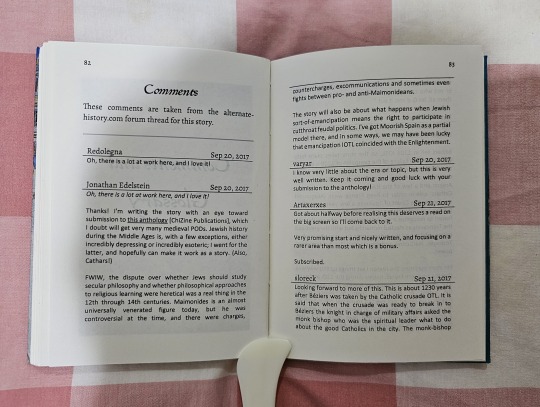

And as always with me, I added-in a comments section to preserve what people thought and discussed of this story when it was first published on alternatehistory.com.
But after all of that, I still feel like giving the background stuff of this tale more justice. So with some consultation from the author, I put-in two more sections denoting the main characters of the story and their real-life counterparts, as well as minor Jewish, French, and Occitan terms that were sprinkled throughout the book.
I have to say, it was quite an experience Googling up which terms meant what to a faith that is not really known to the general public east of India. I think I learned more about Judaism in the last 3 weeks than I ever had in the last 5 years, or even 10!
All in all, this bind was one of the more easier ones to make. I would have made this quicker if not for stuff at work and home delaying progress for a bit. I so wish I could make more than 1-2 books a month, but better to have those 1-2 books than no books at all.

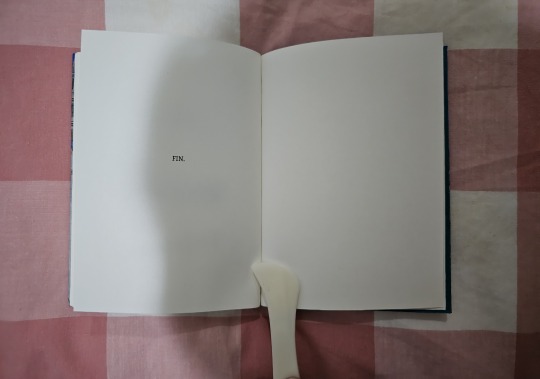
#my bookbinds#bookbinding#fanbinding#jonathan edelstein#The Purim of the Philosophers#alternate history#short story
122 notes
·
View notes